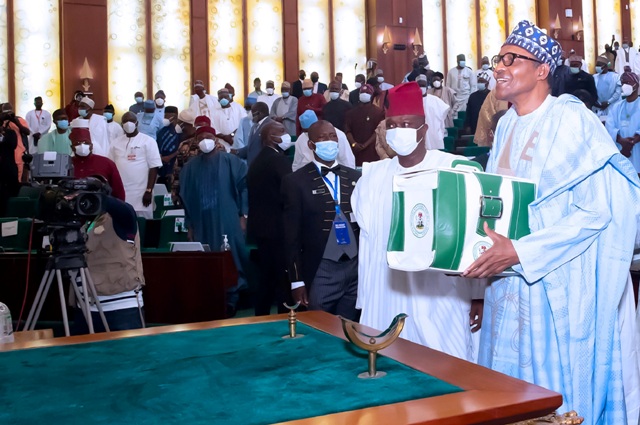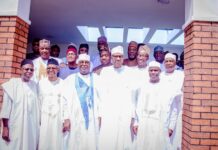
President Muhammadu Buhari yesterday presented the N13.08 trillion budget estimates for the 2021 fiscal year to the joint session of the national assembly for consideration and approval.
The estimate is N2.28 trillion higher than the 2020 revised budget of N10.805 trillion.
Christened ‘Budget of economic recovery and resilience’, the president said the 2021-2023 Medium Term Expenditure Framework and Fiscal Strategy Paper set out the parameters for the 2021 budget, which include benchmark oil price of $40 per barrel; daily oil production estimate of 1.86 million barrels (inclusive of condensates of 300,000 to 400,000 barrels per day); exchange rate of N379 per US dollar, GDP growth projected at 3.0 per cent as well as inflation closing at 11.95 per cent.
Revenue estimates
*Estimated total federally distributable revenue N8.433 trillion in 2021
*Estimated total revenue available to fund the budget, N7.886 trillion (including grants and aid of N354.85 billion as well as the revenues of 60 government-owned enterprises
*Estimated oil revenue, N2.01 trillion
*Estimated non-oil revenue, N1.49 trillion
Expenditure
a. Non-debt recurrent costs of N5.65 trillion;
b. Personnel costs of N3.76 trillion;
c. Pensions, gratuities and retirees’ benefits of N501.19 billion;
d. Overheads of N625.50 billion;
e. Debt service of N3.124 trillion;
f. Statutory Transfers of N484.49 billion; and
g. Sinking fund of N220 billion (to retire certain maturing bonds).
Fiscal Balance
Budget deficit (inclusive of government owned enterprises and project-tied loans), N5.20 trillion
Deficit to be financed mainly by new borrowings totalling N4.28 trillion, N205.15 billion from privatization proceeds and N709.69 billion in draw downs on multilateral and bilateral loans secured for specific projects and programmes.
Statutory transfers
*N484.49 billion provided for statutory transfers as follows:
a. Niger Delta Development Commission – N63.51 billion;
b. North East Development Commission – N29.70 billion;
c. National Judicial Council – N110.00 billion;
d. Universal Basic Education Commission – N70.05 billion;
e. Independent National Electoral Commission – N40.00 billion;
f. National Assembly – N128.00 billion;
g. Public Complaints Commission – N5.20 billion;
h. Human Rights Commission – N3.00 billion; and
i. Basic Health Care Provision Fund – N35.03 billion.
Recurrent expenditure
A chunk of the 2021 recurrent cost estimate is allocated to paying salaries and overheads in MDAs providing these critical public services. These include:
a. N227.02 billion for the ministry of interior;
b. N441.39 billion for the ministry of police affairs;
c. N545.10 billion for ministry of education;
d. N840.56 billion for ministry of defence
e. N380.21 billion for ministry of health.
Debt service
Total debt service estimate N3.12 trillion to be spent as follows
Domestic debts, N2.183 trillion
Foreign debts, N940.89 billion
Transfers to sinking fund to pay off maturing bonds issued to local contractors and creditors, N220 billion
Overhead Costs
Total overhead costs of MDAs and government owned enterprises are projected to rise to N625.50 billion in 2021, mainly due to the inclusion of the overheads of an additional 50 government owned enterprises.
Capital Expenditure
Aggregate sum of N3.85 trillion is expected to be available for capital projects in 2021, as follows
a. N1.80 trillion for MDAs’ capital expenditure;
b. N745 billion for capital supplementation;
c. N355 billion for grants and aid-funded projects;
d. N20 billion for the family homes fund;
e. N25 billion for the Nigeria Youth Investment fund;
f. N336 billion for 60 government owned enterprises;
g. N247 billion for capital component of statutory transfers; and
h. N710 billion for projects funded by multi-lateral and bi-lateral loans.
Highlights of the 2021 capital projects
43. Key capital spending allocations in the 2021 Budget include:
a. Power: N198 billion (inclusive of N150 billion for the power sector recovery plan);
b. Works and housing: N404 billion;
c. Transportation: N256 billion;
d. Defence: N121 billion;
e. Agriculture and rural development: N110 billion;
f. Water resources: N153 billion;
g. Industry, trade and investment: N51 billion;
h. Education: N127 billion;
i. Universal Basic Education Commission: N70 billion;
j. Health: N132 billion;
k. Zonal intervention projects: N100 billion; and
l. Niger Delta Development Commission: N64 billion
























































